Number 8
HIMALAYAS PLUS
MAY-JUNE 2024
Dear Friends,
Greetings from the Centre of Excellence for Himalayan Studies, Shiv Nadar Institution of Eminence, Delhi NCR. We are delighted to present the 8th edition of our Newsletter.
EVENTS
On 9 May, we organised an online talk titled ‘Amdo Lullaby: An Ethnography of Childhood and Language Shift on the Tibetan Plateau’ by Dr. Shannon Ward, Assistant Professor, Linguistic Anthropology, University of British Columbia, based on her forthcoming book with the same title. Dr. Divya Kannan, Assistant Professor, Department of History and Archaeology, Shiv Nadar Institution of Eminence, was the Discussant for the event.
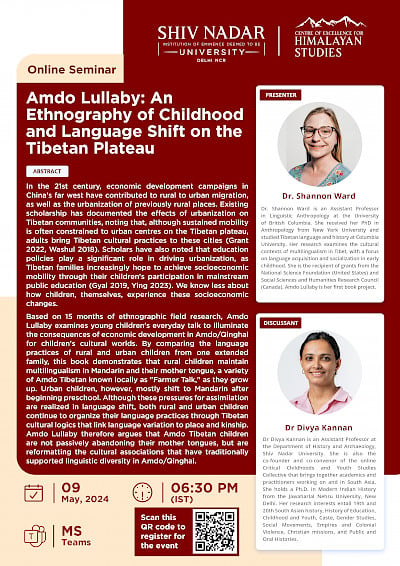
CHS was part of Shiv Nadar IoE’s Young Thinkers Forum Summer School organized on campus for school students from 1-7 June. We conducted a Quiz, titled a ‘Walk Through the Himalayas’, to familiarize the students with the region. Dr. Anand P. Krishnan, CHS Fellow, wore the hat of the quizmaster.
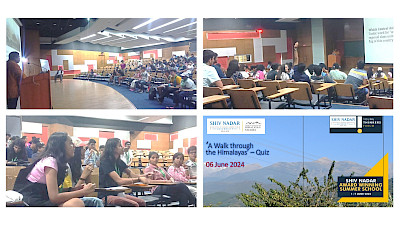
PUBLICATIONS
We published three Issue Briefs in this period.
The first of these was by Dr. Navjot Kour, a Post-Doctoral Researcher at the Catalan Institute of Classical Archaeology, Tarragona, Spain, examining the various social, political and diplomatic factors that influenced the commissioning of subject matter of temple murals in Jammu under the patronage of Dogra kings.
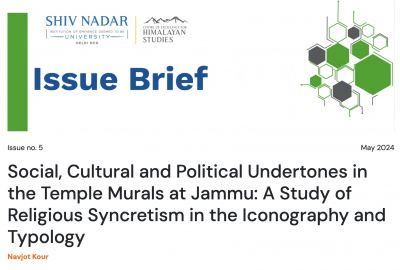
In another Issue Brief, Dr. Diki Sherpa, Post-Doctoral Research Fellow at the Centre for Knowledge Alternatives, FLAME University, Pune, delved into the impact of climate change on agriculture, food security and livelihoods in the Himalayan region through a case study of Himachal Pradesh’s Lahaul-Spiti district.
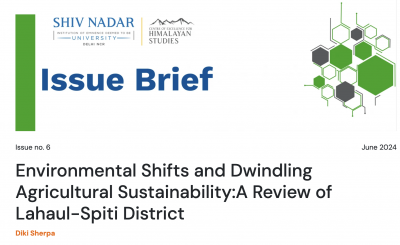
Dr. Swati Chawla, Associate Professor of History and Director of the Post Graduate Diploma of Research and Innovation at O.P. Jindal Global University, Sonipat, Haryana, underlined the need to centre Tibet and Tibetan exiles in Tibetan and Himalayan studies, amidst the growing scholarly and administrative interest in Himalayan region in India.
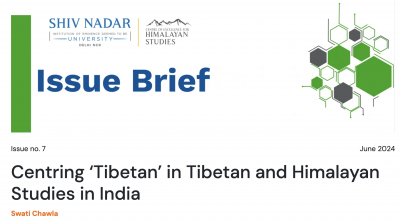
We also published five Commentaries, which were all focussed on the region of Ladakh. In a three-part series, Mr. Muzaffar Hussain, Assistant Professor, Department of Political Science, Maulana Azad National Urdu University, Hyderabad, analyzed the Ladakh Lok Sabha constituency in the General Elections. The first part delved into the elections in 2019, while the second and third parts analyzed the issues surrounding the campaign in 2024, and the final electoral verdict respectively.
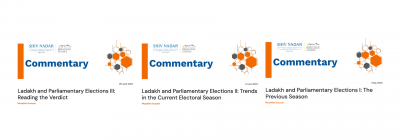
Dr. Stanzin Lhaskyabs, analyzed the role of the Ladakh Buddhist Association in Ladakh's political landscape, and the challenges rising from unaddressed demands as well as growing regional aspirations while Dr. Junjun Sharma Pathak, Assistant Professor, Amity Institute of International Studies, Noida, studied the protests in Ladakh in February-March this year. Together these articles highlighted the issues at play in Ladakh such as the demand for genuine and fairer representation evident in the advocacy for the implementation of the Sixth Schedule of the Constitution as well as changing local dynamics including the growing convergence of interests between the different religious communities of the region.
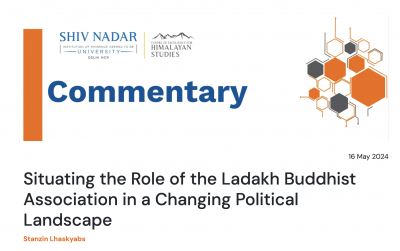
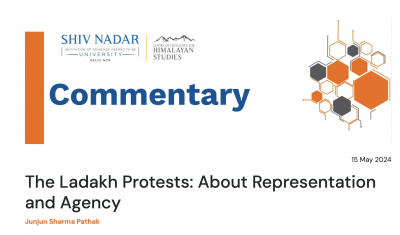
To expand accessibility to our cutting-edge analyses, we have begun translating our publications into languages spoken widely in the Himalayan region. Commentaries by our Distinguished Fellow, Mr. Claude Arpi on Gilgit-Baltistan and infrastructural activities in Pakistan-occupied Kashmir were published in Urdu. Another Commentary by Mr. Arpi on the 65th anniversary of the arrival of Dalai Lama and his entourage in Tawang from Tibet was translated into Chinese.
Translations into Nepali and Tibetan are in the pipeline.
Our researchers also contribute to other platforms, and you can find a selection of these writings on the CHS website.
We welcome writing/publications from scholars, practitioners, and members of the strategic community working on the wider Himalayan region around four broad themes: borders and identities, economy, environment and geopolitics. However, we are open to ideas and suggestions on other areas of interest. Those interested may get in touch with us on our email [email protected]. For more information, please visit our website.
IN THE MEDIA
In an article for 360info, CHS Director, Dr. Jabin T. Jacob argued about the hard foreign policy choices before the newly elected Indian government in the face of serious global challenges. He authored two pieces for the Deccan Herald – in the first one, he pointed out the evident confusion in India’s economic policy towards China, while the second piece offered suggestions for creative political and economic policies by India to gain better leverage with China.
In an extensive interview to The Diplomat, Dr. Jacob discussed China’s deepening engagements in South Asia. He also shared his views on the China challenge for the re-elected National Democratic Alliance government in India, for the South China Morning Post and Bloomberg TV. His views on river-water agreements between India and China also appeared in the Deccan Herald.
Our Distinguished Fellow, Mr. Claude Arpi, wrote four articles for Firstpost. In the first, he analyzed China’s intent to narrow down the Tibetan question to only the Dalai Lama’s future. In the second, he discussed New Delhi’s purported decision to rename 30 places inside Tibetan Autonomous Region in response to China renaming places within Arunachal Pradesh, asserting how Indian interests in Tibet still remain strong. He also wrote on the visit of a US Congressional delegation led by House Foreign Affairs Committee Chairman Michael McCaul to meet the Dalai Lama and Tibetan Government-in-Exile in Dharamshala. In the final piece, he delved into China’s involvement in road building activities in Shaksgam Valley in Pakistan-occupied Kashmir, and also discussed the history of the region in October-November 1962.
Mr. Arpi also wrote for Rediff News about his experience visiting Nilang, Jadhang and Pulam Sumda, the last villages on the Indian side of the border with Tibet in Uttarakhand. He penned another piece for Natstrat, on the Central Sector of the India-China boundary.
On TV, Mr. Arpi shared his views on US Congressional delegation’s visit to Dharamshala, and the passing of the Resolve Tibet Act by the US Congress for News9 and appeared on DEF Talks by Aadi to discuss China’s new tactics against India of cartographic warfare and renaming of territories.
CHS Fellow, Dr. Anand P. Krishnan together with CHS Director, Dr. Jabin T. Jacob parsed through election manifestos of select political parties to identify the shadow of China in Indian imagination and policymaking in a long-form piece for The India Forum.
In another joint piece, Associate Fellow, Dr. Devendra Kumar and Dr. Anand P. Krishnan, wrote for the Deccan Herald on Russian President Vladmir Putin’s visit to China, and its implications for India.
FACULTY UPDATE
CHS Director, Dr. Jabin T. Jacob was a panelist on two discussions on the foreign policy front for the new Indian government. The first of them, hosted by the Asia Freedom Institute was on the immediate future of India-China relations. The second one, hosted by the South Asia Program at the Stimson Center, Washington DC, focussed on India’s regional foreign policy agenda.
Prof. Kaveri Gill, our Non-Resident Senior Fellow, gave a series of lectures at the Tushita Centre, Delhi. The lectures were titled ‘Competition and Cowardice’, ‘Compassion and Courage’, and ‘Cognitive Change for a Happier Life’.
Dr. Devendra Kumar, Associate Fellow at CHS, spoke at the panel discussion on ‘From the “Two Sessions” to the Third Plenum: Understanding the Chinese Party-state’s Priorities, Challenges, and Future Directions’, organized by the Institute of Chinese Studies, New Delhi, as part of their Wednesday Seminar series. CHS Fellow, Dr. Anand P. Krishnan was moderator at the event.
You can stay updated with our publications, events, and activities through our website, X (@Himalayas_SNU), and Facebook. We welcome your feedback and appreciate your continued support!
Share this: